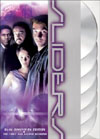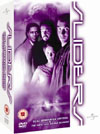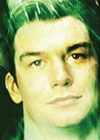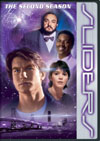This story taps into some archetypal human struggles to get the audience invested in its main characters, before launching into one sci-fi twist after another to lend some fascinating perspectives and philosophies on the situation. Although some of the dialogue dredges up similar dynamics to the anti-choice time travel conundrums often plaguing 20th century sci-fi, the devices used in this story force one to dig deeper and think more extensively about the dynamics in play, and it becomes something truly unique in the annals of science fiction. I'm impressed, and I think I like it a lot in spite of its few glaring shortcomings.
"...Reminds me of Vancouver."The portions in Nueva España world are full of a lot of tongue in cheek in-jokes, some of which unintentionally magnify in retrospect. First, there are the Canadian connections. All the complaining about San Francisco weather is in a way masking the fact that what cast & crew REALLY want to do is complain about the weather in Vancouver, B.C., Canada, which is equally if not more cold & wet. (This is more of a west coast thing than a Canadian thing, especially the wet part.) And they have had far wetter and darker conditions to deal with during season two's shoot than the much brighter conditions seen in season one.I can assure you that we Canadians listen to a vastly wider variety of music than our most clichéd exports Anne Murray and Gordon Lightfoot, who are good but don't really register on my list of favourite or repeat-listening music. Come on, Rembrandt, get with it. Of course the supporting cast and half the crew are Canadian themselves, with "Sliders" being Jerry O'Connell's second major TV series shot in Canada after Toronto's "My Secret Identity", so you have to assume that they're poking fun at themselves with half of this stuff. The second big in-joke is of course Charlie O'Connell's guest appearance in the cast. Yes, we remember him too! His appearance here is fun, and Charlie plays this role to good serious effect.
"This is so trippy! We keep getting involved with the same group of people."Early action provides typically good "Sliders" stuff, but doesn't stand out too much, while the wormhole effect enjoys a very effective introduction at a later stage. A lot of other "Sliders" stories feature similar events at their conclusion, and this now becomes a story of escalating proportions as it continues to look for greater resolution beyond the formulaically obvious.This second portion of the tale contains the emotional heart of the story. Interesting patterns and recurring themes begin to take shape here, having an extra weight to them at this stage. One of the best parts of this story's score is Stephen Graziano's underscore for the a key scene at the end of the second act, a nice complement to many of the livelier action cues used in other parts of the story.
Time's ArrowEven just having a third act on this subject would yield a good, powerful, high-ranking story within season two, but our creative writer Steve Brown doesn't stop there. In comes yet another idea so unique, I don't think any other sci-fi show has even attempted it before or since, and thankfully it is a really good match to what the rest of the story has been about. The theory explored here seems to want to prove that time is a scalar rather than a vector, and is just as likely to flow in reverse as it is forwards.Two caveats spring to mind instantly, which I will save for the in-depth analysis version of this review along with many more details dissecting the concluding drama and its climax. There is, however, still a lot of food for thought I don't mind sharing with people before they see the story....
DiscontinuityOne of the most difficult concepts of this story is that of "discontinuity", which doesn't really make satisfying sense if one looks purely at physics alone. It seems to work better once the mind/brain and its functions of perception come into play. I'm reminded of the experiment in which, for days on end, people wore special glasses that made everything look upside down. After a while, their brains compensated for what they were seeing and they could perceive the world right side up again, walk around, pick objects up, etc., and basically function as normal again. (Check out "What the Bleep Do We Know" for the full story on that.) Perhaps something similar is happening here to the Sliders.... Now it's somewhat more plausible. It's still not quite as neat or accessible to the audience as a similar effect (from an entirely different cause) that was achieved in the coolly bizarre film "Memento" with Joe Pantoliano and Carrie-Anne Moss.Through his dialogue, the writer leans a little too heavily on the idea of pre-destined time-lines for my tastes, which all too often grate against heroics and common sense.
Parallel vs. Branching UniversesThose of you who have been reading my reviews of time travel conundrums know how passionately I favour heroics over pre-destined outcomes, and how much I often claim that awareness of parallel universes such as the ones explored continuously on this show, are in fact the best cure for the kind of pre-destiny reverence that fuels heroic phobias. Technically, we shouldn't really call such universes "parallel" within my paradigm, because the word suggests that they would never intersect. We should really call them "branching" universes, since one universe upon reaching a point where an individual makes a choice, and all other conscious entities in that universe make quantum complementary choices, would then split into two or more universes.... and so on and so on, multiplying the number of branching universes tens of thousands of times each day, as time moves forward.Uh oh. What if time were now moving forward for some decision-makers, while moving backwards for others? Are alternate universes now branching off of one another in two different "directions" of time? Or is one set of decision-makers stuck with "collapsing" universes, as they get closer and closer to a "common root" on the decision-making cause-and-effect tree? Very few sci-fi stories successfully challenge my current paradigm and cause it to grow. This one has at least thrown down the gauntlet successfully. Respect. This story really has belonged to Quinn, and it successfully brings many of his issues to a ciritcal point for the climax of the story, mirroring a dynamic that also really supercharged some popular feature films. And I think that's about all I can say here, to avoid giving away the ending.
This story has become available on DVD. Click on the Amazon symbol for the location nearest you for pricing and availability:
Comments on this article are welcome. You may contact the author from this page:
|









